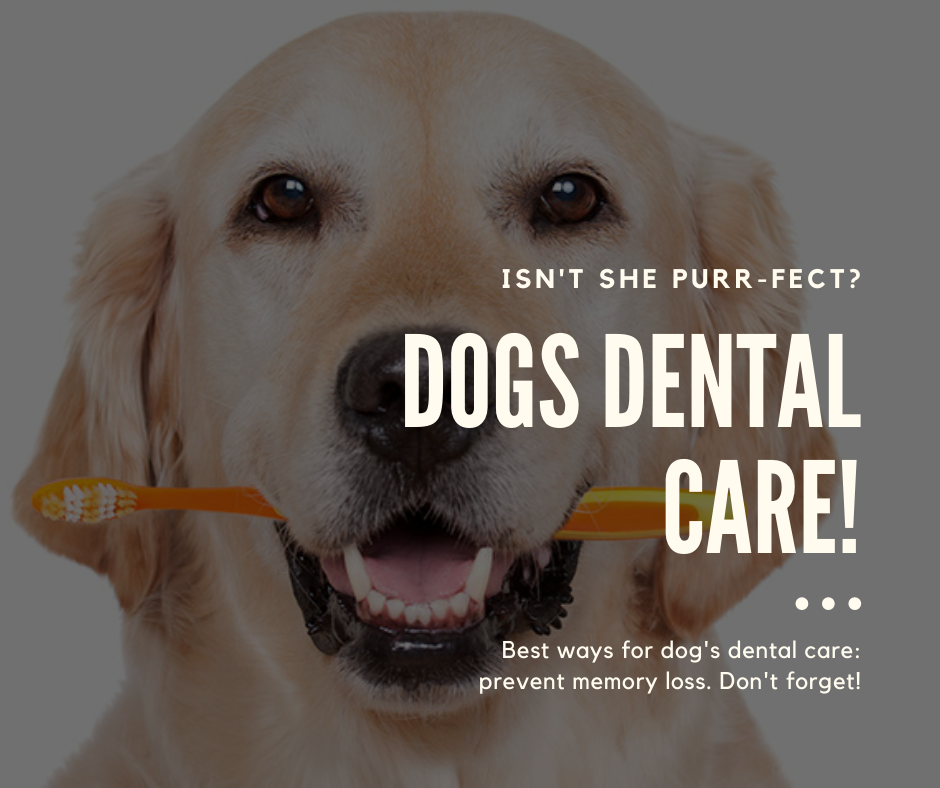
Dental Care

Introduction:
For the complete health and well being of your dog, you should be more attentive about dental care of him. Dog's dental care provides your dog with long-term protection from dental problems. It can deal with problems like inscription formation, tartar, gingivitis, periodontitis, and tooth deterioration. Failure to maintain dental hygiene results in bacterial infections that will initially cause pain and stress to your dog resulting in behavioral changes. Later on, this infection may spread systemically to the liver, heart, spleen, and kidneys of the dog resulting in serious clinical manifestations.
Best ways for dog's dental care:
Just like humans, dog's dental care requires brushing their teeth ideally on the daily basis. You can also limit it to three or four times a week. However, a usual checkup by a veterinary dentist is required for a thorough dental treatment for the areas that remain untouched during brushing for removal of plaque or tartar, once a year.
Dog's Toothbrush:
Brushing the dog's teeth is an excellent way for his dental care. If you and your dog are new to this technique, you can make him habitual by following the baby steps. You need to start by making him comfortable by opening his mouth and putting your finger on his teeth. It requires two to three days to make him habitual. Then you should come up with a toothbrush. Now you have to follow the same technique to make him comfortable. When you feel that you have made him habitual, use toothpaste designed for a dog's dental care for maintaining oral hygiene.Caution! Human toothpaste should not be used for this purpose as they contain artificial sweeteners like xylitol and other ingredients such as detergents and fluorides etc. that are toxic for a dog's health. If swallowed, they may cause stomach upset and other health issues.
Dog's Finger Toothbrush:
If your dog is not comfortable with the above technique, you can use a finger toothbrush that is convenient for both of you. A finger toothbrush can fix on your finger and is easy to handle if your dog is not comfortable with the dog's toothbrush. You can also ask your veterinarian for the superlative option.
Dog's Dental wipes:
If you are unable to brush the teeth or your dog is not comfortable with toothpaste and toothbrush, you should come up with dental wipes. This cleaning technique requires rubbing the tooth wipes against your dog's teeth to remove the plaque. They are not as efficient as toothbrushes as they are unable to reach tiny nooks and crannies. However, they are easier to handle than a toothbrush with toothpaste.
Dog's Dental Chews:
There are various types of chews available for dog's dental care with cleaning properties. On the other hand, the eating action is favorable for the dental health of your dog regardless of what is it chewing. Natural chews like chicken strips, goat ears, and cow sticks provide a healthy way to clean a dog's teeth providing nutrition and cleaning action at the same time.
Dental Toys for dogs:
There are various toys made up of nylon or rubber that provide an artificial way for dental cleaning through chewing without adding calories. They should be kept away from the dog after playing with them.
Dental treats for dogs:
Dental treats for dogs are available in different shapes and flavors that are loved by dogs. They keep the dog happy and provide dental health. They are added with ingredients that keep their mouth clean and freshen their breath.
Food Preference for dogs:
Soft and sticky foods remain in cavities and adhere to teeth for a longer duration of time resulting in tooth decay. Dry and crunchy kibble should be proffered over soft and sticky food items.
Professional Cleanings:
At least once annually, dogs should be routinely checked up by a veterinarian for professional cleaning of teeth under anesthesia. It is the best way for dental care as it involves the cleaning of the periodontal area and areas where the plaque is still present. The veterinarian being proficient in preventing, locating, and treating unnoticed problems will guide properly about the best ways for your dog's dental care, at that stage.
Normal appearance of the dog's teeth:
The teeth of a healthy dog should be white or pearly white, appear clean without plaque deposits or tartar. Their gums should be healthy and pink in appearance.
Importance of dog's dental care:
- Dental care is emphasized because the health and behavior of your dog depend upon oral hygiene.
- Prevention of teeth loss is important and can be done by strengthening the supportive structures of teeth. So prevention of damage and infection is a basic need.
- Prevention of oral pain. Inflammation of gums results in pain and stress to your dog's that changes his behavior and he looks agitated. Maintaining oral hygiene protects the dog from infection and inflammation.
- Prevention of systemic infection: Bacterial infection through decayed gums might spread via the blood to different organs like the heart, spleen, kidney, and liver resulting in serious ailments. Healthy gums may prevent systemic infection.
- Prevention from worsening dental disease: Maintaining oral hygiene results in prevention from plaque deposition and tartar.
When to visit the veterinarian
If you notice the following symptoms in your dog, your dog needs a dental check up.- Bad smell breathing
- Changing in eating habits and chewing habits
- Pawing at the face
- Depression
- Behavior changes
- Misaligned or missing teeth
- Discolored, broken, missing
- Red, puffy, painful,
- Plaque deposits on teeth
- Bumps or growths within the mouth
- Excessive salivating
